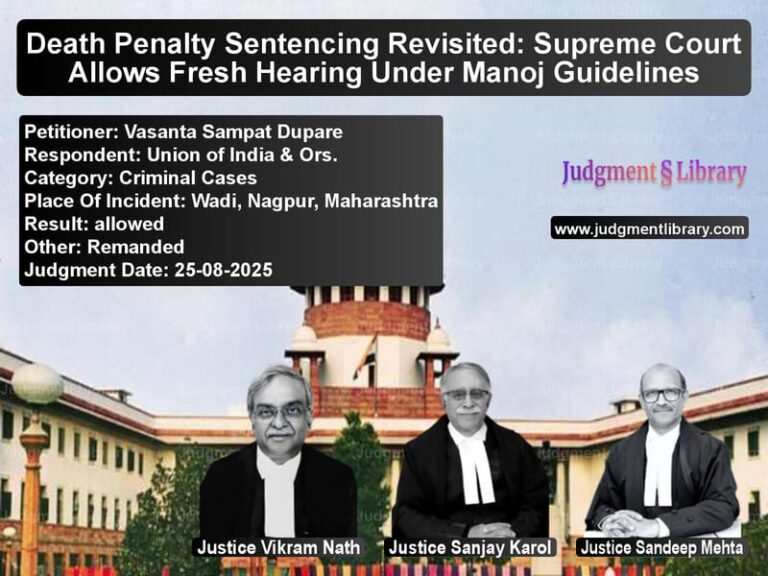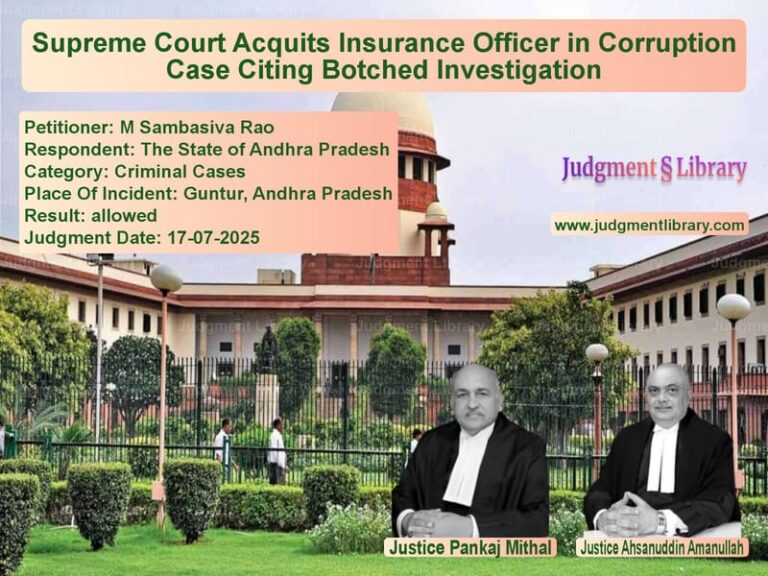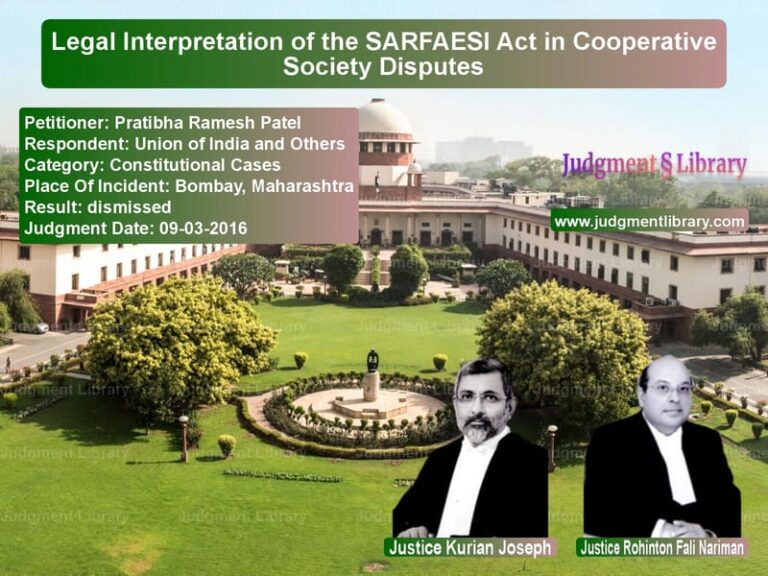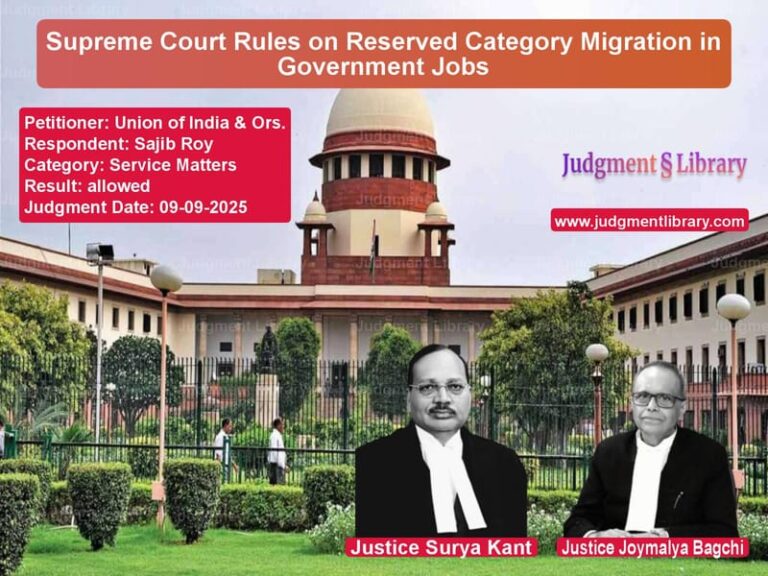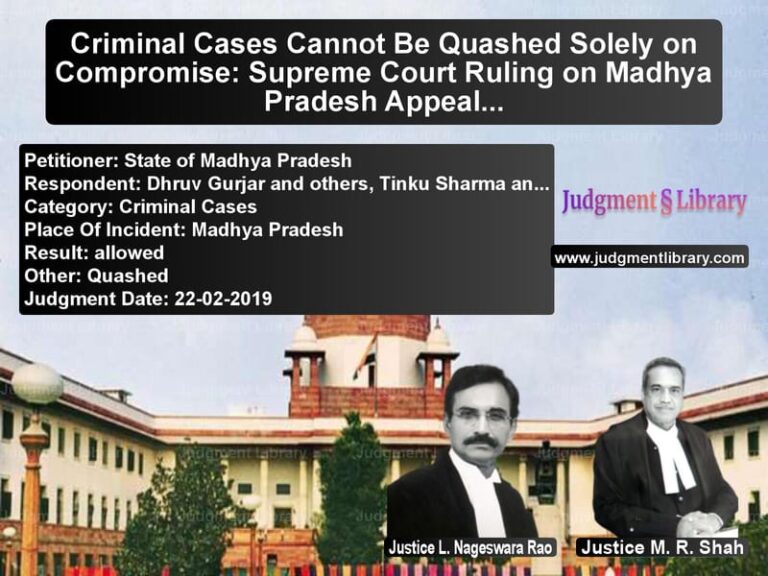Supreme Court Directs Equal Examination Accommodations for Persons with Disabilities
The Supreme Court of India, in its judgment dated February 3, 2025, ruled in favor of Gulshan Kumar, directing examination bodies to extend examination accommodations, including scribes and compensatory time, to all persons with disabilities (PwD) and not just to those with benchmark disabilities (PwBD). The Court ordered the revision of the Office Memorandum dated August 10, 2022, issued by the Ministry of Social Justice and Empowerment, ensuring compliance with the Rights of Persons with Disabilities (RPwD) Act, 2016.
Background of the Case
The petitioner, Gulshan Kumar, a candidate with a 25% permanent disability diagnosed as Focal Hand Dystonia (Writer’s Cramp), sought accommodations such as a scribe and compensatory time for multiple competitive examinations, including those conducted by:
Read also: https://judgmentlibrary.com/supreme-court-orders-reinstatement-of-municipal-workers-in-ghaziabad/
- Institute of Banking Personnel Selection (IBPS)
- State Bank of India (SBI)
- Staff Selection Commission (SSC)
- Bihar Staff Selection Commission (BSSC)
However, these accommodations were denied based on the argument that such benefits were limited to candidates with a benchmark disability (40% or more) under the RPwD Act, 2016. Feeling aggrieved, Kumar filed a writ petition before the Supreme Court.
Petitioner’s Arguments (Gulshan Kumar)
The petitioner argued:
- Denial of a scribe and extra time based on a disability threshold violated his fundamental rights under Articles 14 and 21 of the Constitution.
- The Supreme Court’s judgment in Vikash Kumar v. UPSC and Avni Prakash v. NTA had already clarified that the benefits of a scribe and compensatory time should not be restricted to only PwBD candidates.
- Examination bodies failed to incorporate these accommodations in application forms, effectively excluding PwD candidates from availing of necessary facilities.
- The August 10, 2022, Office Memorandum failed to ensure equal examination opportunities and contained unreasonable restrictions.
Respondents’ Arguments (Examination Bodies & Government)
The examination bodies and government agencies countered:
- The Institute of Banking Personnel Selection (IBPS) claimed it was a private trust, not a “State” under Article 12 of the Constitution, and thus not subject to writ jurisdiction.
- The State Bank of India (SBI) and other examination bodies stated that they followed existing policies and had not acted in violation of any legal framework.
- The Bihar Staff Selection Commission (BSSC) argued that their policies provided scribe facilities only for PwBD candidates as per state regulations.
- The Ministry of Social Justice and Empowerment maintained that they had already issued guidelines for facilitating examination accommodations for PwD candidates.
Supreme Court’s Observations
The Supreme Court held:
“The principle of reasonable accommodation is central to ensuring equality for all persons with disabilities. Denying the facility of a scribe or compensatory time constitutes discrimination under the RPwD Act, 2016.”
The Court rejected IBPS’s claim of immunity from writ jurisdiction, citing Kaushal Kishor v. State of Uttar Pradesh, which held that fundamental rights under Articles 19 and 21 are enforceable even against private entities.
The Court further ruled:
“The distinction between PwD and PwBD candidates in examination accommodations is arbitrary and unjustified. The benefit of a scribe and compensatory time must be extended to all candidates who require it, regardless of the percentage of disability.”
Final Judgment
The Supreme Court issued the following directives:
- The Office Memorandum dated August 10, 2022, shall be revised to include all PwD candidates for examination accommodations.
- All examination bodies must modify application forms to incorporate scribe and compensatory time options for PwD candidates.
- A centralized grievance redressal mechanism shall be established for candidates facing denial of accommodations.
- The validity of scribe certification shall be extended beyond six months to prevent unnecessary delays.
- Examination bodies shall explore alternatives such as allowing candidates to type their answers or use assistive technology.
- Strict penal action shall be taken against officials who fail to implement these accommodations.
Impact of the Judgment
This judgment has wide-ranging implications for persons with disabilities in India:
- Ensuring Equal Access: The ruling eliminates discrimination against PwD candidates in competitive examinations.
- Strengthening Judicial Oversight: The Court reaffirmed its role in enforcing the RPwD Act, 2016, and ensuring compliance by examination bodies.
- Encouraging Inclusive Practices: The judgment sets a precedent for better inclusion of disabled candidates in employment and education opportunities.
- Preventing Bureaucratic Delays: By extending scribe certificate validity and mandating uniform policies, the ruling simplifies procedures for PwD candidates.
Conclusion
The Supreme Court’s judgment in Gulshan Kumar v. Institute of Banking Personnel Selection & Others is a landmark ruling that ensures equal educational and employment opportunities for persons with disabilities. By removing arbitrary restrictions and enforcing reasonable accommodations, the Court has strengthened the rights of PwD candidates, reinforcing the principle that access to education and employment must be inclusive and non-discriminatory.
Petitioner Name: Gulshan Kumar.Respondent Name: Institute of Banking Personnel Selection & Others.Judgment By: Justice J.B. Pardiwala, Justice R. Mahadevan.Place Of Incident: India.Judgment Date: 03-02-2025.
Don’t miss out on the full details! Download the complete judgment in PDF format below and gain valuable insights instantly!
Download Judgment: gulshan-kumar-vs-institute-of-banking-supreme-court-of-india-judgment-dated-03-02-2025.pdf
Directly Download Judgment: Directly download this Judgment
See all petitions in Employment Disputes
See all petitions in Public Sector Employees
See all petitions in Recruitment Policies
See all petitions in Judgment by J.B. Pardiwala
See all petitions in Judgment by R. Mahadevan
See all petitions in allowed
See all petitions in Modified
See all petitions in supreme court of India judgments February 2025
See all petitions in 2025 judgments
See all posts in Service Matters Category
See all allowed petitions in Service Matters Category
See all Dismissed petitions in Service Matters Category
See all partially allowed petitions in Service Matters Category


